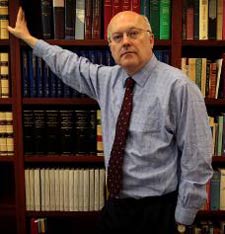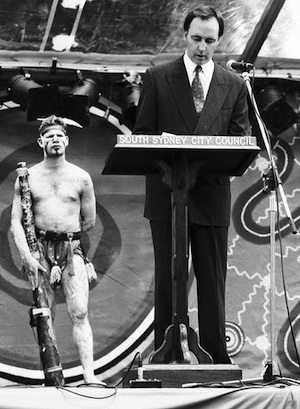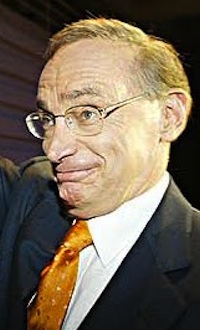Carr and Brandis talk constitutional talk
 City Desk •
City Desk •  Friday, May 20, 2011
Friday, May 20, 2011 New constitutional reform unit at Uni of Sydney ... Indigenous recognition, the role of state governments, and local government all on the agenda ... Constitutional trogs Bob Carr and George Brandis part of the launch line-up ... Our man with a notebook was there for the ribbon-cutting
It may have been fate, or the result of the happy conjunction of Jupiter, Mars, Venus and Mercury, that the launch on Thursday (May 19) of the University of Sydney's new Constitutional Reform Unit coincided with the release of a discussion paper by the PM's Expert Panel on Constitutional Recognition of Indigenous Australians.
That paper aims to foster popular discussion of the topic before the proposed referendum on constitutional recognition, but first there were speeches from former premier Bob Carr and shadow attorney general George (Soapy) Brandis.
There's more from Bob on his blog.
Despite the happy coincidence, indigenous constitutional recognition wasn't the major focus of the night.
None of the speakers gave the usual acknowledgment of country at the start of the night, perhaps following Victoria's lead on the issue.
Neither has the public twigged to the release of the discussion paper, with the Twitter channel @youmeunity having only 30 followers as of this afternoon (but then they'd only tweeted three times).
Let's hope this isn't an indication of the true level of community concern for what Julia Gillard has said is "an important step to building trust and respect".
On the topic of that discussion paper, Brandis mused on the importance of "legal rigour" in constitutional reform, saying his "ire" had been raised by an "intellectual error" in one sentence of the paper. This is what it said:
"Many Australians feel the need to address the gaps in our Constitution, to bring it up to date to reflect the reality of Australia in the 21st century and to create a shared vision of the kind of nation we aspire to become."
 Soapy: rooting out "intellectual error"Seems harmless enough, but not to Soapy.
Soapy: rooting out "intellectual error"Seems harmless enough, but not to Soapy.
In his quest to root out "intellectual error" he found this sentence almost laughable.
On his analysis, it presupposes three things: the existence of "gaps" in our Constitution; that there is consensus as to the "reality of Australia in the 21st century"; and that there is a "shared vision" of what Australia aspires to become - all contentious issues to which the answers should not be assumed.
He contrasted the idea of presupposed unity embodied in this statement with his passionate defence of multiculturalism and diversity earlier this year.
While he - and the coalition - accept the argument for recognition of indigenous people in our Constitution, Brandis said it was important to keep it "minimal".
Indigenous recognition is symbolic, and should be kept as such, he said.
He made the argument that constitutional change is difficult, and it is important to put forward a proposal that will achieve consensus and agreement (no mention of diversity here).
 Keating at Redfern: wanted meaning for "justice & equality"Bob Carr agreed, saying that public support for the indigenous recognition referendum will disappear at the mere thought of anything more than the symbolic - for example, substantive rights, or (heaven forbid) compensation.
Keating at Redfern: wanted meaning for "justice & equality"Bob Carr agreed, saying that public support for the indigenous recognition referendum will disappear at the mere thought of anything more than the symbolic - for example, substantive rights, or (heaven forbid) compensation.
While their scepticism about the Australian public may be justified, one wonders what has happened to the call for action in Keating's historic 1992 Redfern speech, where he said:
"We have to give meaning to 'justice' and 'equity' - and ... we will only give them meaning when we commit ourselves to achieving concrete results."
Brandis outlined other areas he nominated for constitutional reform: the machinery of government, including the fact that blocking of supply by the Senate does not necessarily lead to a double dissolution; and reducing the scope of Commonwealth power - specially the appropriations power as outlined in Pape (the GFC handout case) and the external affairs power.
On the question of codification of constitutional conventions, he couldn't resist a dig at the current minority government, arguing that if the carbon tax fails, it should be considered as a loss of confidence in the government.
He said he was for the constitutional recognition of local government, the one point of contention he had with Bob Carr.
The former premier didn't like this idea one bit, recalling his time as NSW Planning Minister in the 1980s and the need for executive control over local councils without judicial oversight (see more on his blog). He said:
"Roughing up local government is a joy that cannot be drained from a state government."
 Carr: keep it symbolicOn the workability of our constitution more broadly, Carr the interesting (and much overlooked) fact that despite the supposed "inefficiencies" of federalism, Australian government spending as a percentage of our economy (at 24 percent) is 15 percent less than the UK, and 25 percent less than many European countries, including France, that have unitary governments.
Carr: keep it symbolicOn the workability of our constitution more broadly, Carr the interesting (and much overlooked) fact that despite the supposed "inefficiencies" of federalism, Australian government spending as a percentage of our economy (at 24 percent) is 15 percent less than the UK, and 25 percent less than many European countries, including France, that have unitary governments.
However, this may be because our federalism is more of a federalism in name than in fact. Centralisation of power and government income have meant the states have an ever-decreasing role to play.
As support for this, Carr pointed to the fact that Victoria now has a Minister for Respect.
What next? A Queensland Minister for Dignity? A Tasmanian Minister for Hope? Perhaps all state cabinets will become "Cabinets of Virtues".
He briefly touched on his simple republic proposal to replace all references to the Queen in our Constitution by references to the governor general.
With that, the speeches came to an end.
Question time was given spice by the cameo appearance of Bryan Pape, of aforementioned Pape v Commonwealth fame.
Predictably, perhaps, his question was aimed at the fiscal position of states in our federation, specifically the possibility of reform to the grants power under s.96.
Stephen Blanks from the NSW Council of Civil Liberties finished with a question on the possibility of a constitutional Bill of Rights - an inquiry that received short shrift from this panel.
Sydney Law School Dean Gillian Triggs spoke the magic words of opening and the Constitutional Reform Unit was launched.
The first issues the CRU will examine include the method of indigenous recognition, recognition of local government, and Barry O'Farrell's proposed constitutional reform to allow for recall elections in NSW.
The CRU is a non-partisan body that aims to "provide research and analysis which explain the background to reform proposals, including the history and operation of existing provisions".
It says it will not "advocate particular reforms".










Reader Comments